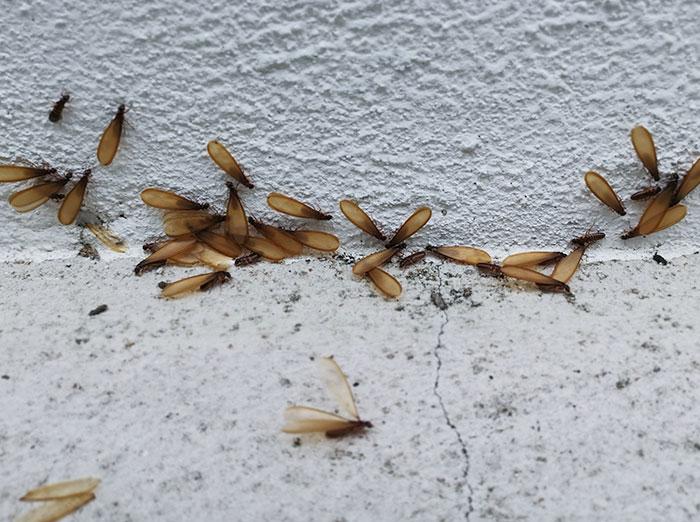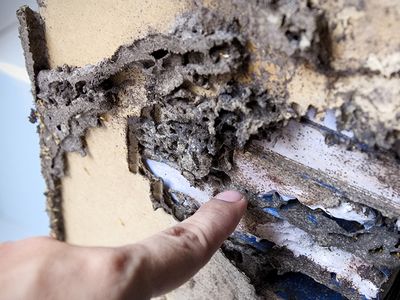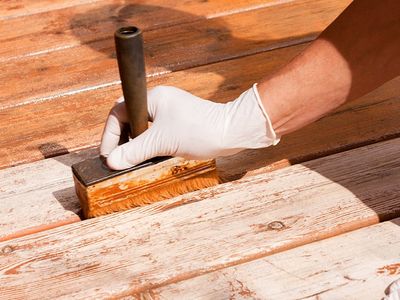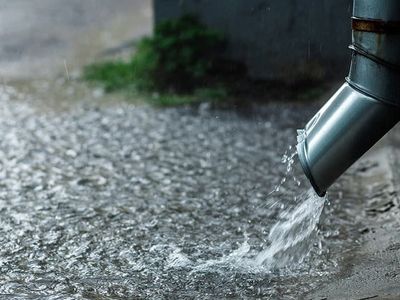Identifying the early warning signs of termites vs established infestations in Virginia
What are the warning signs of termites? As a Virginia homeowner, this is an essential question to ask in order to safeguard your home from these wood-damaging insects. Because termites cause billions of dollars in damage each year in the United States, early detection can make all the difference when it comes to preventing costly termite damage. Knowing what the warning signs of a termite infestation can help property owners act before it’s too late. In this article, our local pest control company will distinguish between early warning signs and signs of an established termite infestation.

Early warning signs of termites
Early detection of termites can be difficult since the damage they cause isn’t apparent at first. However, a few signs can help you catch a potential infestation before it becomes severe.
- Swarming termites and discarded wings
One of the first signs of termite activity is the presence of termite swarmers. Swarmers are reproductive termites that leave their colony to find mates and establish new colonies. Swarming typically occurs when the weather warms up. You might see them flying near windows or doors.
If you don’t see the swarm, look for discarded wings—a clear sign that swarmers have been inside your home. Once they find a mate, swarmers shed their wings, leaving them behind on windowsills and around windows and doorways. - Mud tubes
Mud shelter tubes are another early sign of termite activity. These small, pencil-sized tubes are made of soil, wood, and termite saliva, and they help protect termites as they travel between their underground colony and food sources inside your home. You can often find mud tubes along foundations, crawl spaces, or walls.
If you come across mud tubes, break off a small piece to check for live termites. If they’re still active, the tube will likely be repaired, or you might spot termites traveling through it. - Hollow sounding wood
Termites consume wood from the inside out, so they often leave the outer layer intact, making it hard to notice the damaged wood. If you tap or knock on a piece of wood and it sounds hollow, it’s a sign termites could be feeding inside.
Signs of an established termite infestation
Once an established termite colony is in your home, the damage becomes more noticeable and severe. Signs of an established infestation include:
- Visible and potentially significant termite damage
As termites continue to feed on wood, the damage becomes more apparent. Wood that has been extensively eaten away will appear weak and compromised, often showing signs such as crumbling or buckling wood, swollen floors or walls, sagging ceilings, darkening or blistering of wood surfaces, and uneven or bubbling paint or wallpaper. You may also find that doors and windows are harder to open or shut due to the damage to the framing. - Widespread mud-tube networks
If you find extensive mud tubes running along the foundation or even up walls, this indicates that the termite colony is well-established and actively feeding. Once the colony has expanded, these tubes are often more numerous and larger. - Swarming termites indoors
The colony is mature and ready to expand if you see termites swarming indoors. Swarming termites indoors is a clear sign of a full-fledged infestation, meaning the termites have lived inside the structure for an extended period. These insects are looking to reproduce and establish new colonies within your home.
What to do if you find signs of termites in your Hampton Roads home
If you spot any of these early warning signs or signs of an established infestation, it’s essential not to panic but to act quickly. Termites can cause significant structural damage over time, so contacting a licensed termite control professional for an inspection is critical. A professional will identify the level of termite activity, assess any existing damage, and recommend a treatment plan to eliminate the termites and prevent future infestations.
How Getem Services can help you exterminate termites
At Getem Services, we provide effective termite control solutions in Norfolk, Chesapeake, Virginia Beach, and Hampton Roads. Our process begins with a thorough inspection of your property to:
- Confirm termite activity and determine the severity of the infestation
- Assess the extent of termite damage, if any
- Identify conditions that could attract termites
- Develop a tailored plan of action based on the findings
Once the inspection is complete, we explain our treatment process and schedule a liquid termite treatment to target the colony.
Effective liquid termite treatment
We use Termidor®, America’s #1 termite defense product, to eliminate termites effectively. This liquid treatment works through contact and ingestion. When termites come in contact with Termidor, they unknowingly ingest it and transfer it to other termites, ultimately eliminating the entire colony, including the queen. In addition to killing termites, Termidor creates a protective barrier around your home to prevent a new colony from establishing.
How to prevent termite infestations
To minimize the risk of termites entering your home, here are some prevention tips:
- Ensure there is no direct soil-to-wood contact
- Fix any leaking pipes or appliances promptly
- Reduce moisture levels and humidity in crawl spaces
- Avoid storing firewood and other wood products against your foundation
- Seal any cracks or gaps in your home's exterior
- Keep gutters clean and in good repair
By following these steps, you can make your property less inviting to termites and reduce the chances of an infestation.
Contact Getem Services for the best termite control in Hampton Roads
Recognizing the early warning signs of termites and understanding the signs of an established infestation is crucial for homeowners. By staying vigilant and addressing potential termite issues early, you can prevent costly damage and protect your home. If you spot any signs of termites, contact Getem Services for proven termite control. We’ll help you eliminate and prevent termites from damaging your home.
For more information or to schedule a termite inspection, contact us today!

























